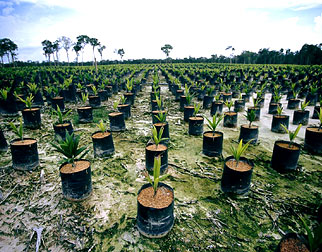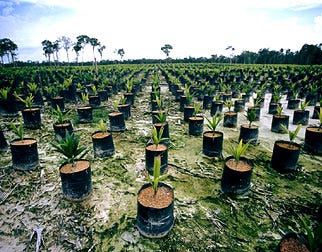NewPage, WRI, Launch Partnership to Protect Indonesian Forests
January 30, 2014

 The World Resources Institute (WRI) and coated-paper manufacturer NewPage Corporation today announce a partnership to protect forests in Indonesia. NewPage will substantially fund WRI's "Project POTICO" (Palm Oil, Timber, Carbon Offsets), an initiative to combat illegal logging and preserve virgin rainforests in Indonesia by diverting new oil palm plantations to degraded lands.
The World Resources Institute (WRI) and coated-paper manufacturer NewPage Corporation today announce a partnership to protect forests in Indonesia. NewPage will substantially fund WRI's "Project POTICO" (Palm Oil, Timber, Carbon Offsets), an initiative to combat illegal logging and preserve virgin rainforests in Indonesia by diverting new oil palm plantations to degraded lands.
"Deforestation is having a significant impact on people, biodiversity and the climate," said Jonathan Lash, president of WRI. "Project POTICO will relieve pressure on Indonesia's virgin tropical rainforests, reduce greenhouse gas emissions from forest clearing, and prevent the loss of biodiversity in forests slated for conversion to oil palm plantations. Well-designed oil palm plantations in degraded areas would create local jobs and protect traditional livelihoods of forest-dependent people."
Indonesia's tropical rainforests are being cleared at a rapid rate, primarily by construction of oil palm plantations. One consequence is that Indonesia has now become, according to some estimates, the world's third largest emitter of greenhouse gases. Although the country has at least 50 million acres of degraded land that could be used for plantations, oil palm, timber, and rubber plantations continue to push into virgin forests and fuel illegal logging.
"Project POTICO, in combination with the U.S. Lacey Act, will help level the global playing field by minimizing illegal logging and reducing the amount of product brought into the United States that is produced in violation of the law," said Rick Willett, president and chief operating officer for NewPage. Recent amendments to the Lacey Act now make it illegal to import into the U.S. wood or paper derived from illegally harvested trees. "We are making an investment in this project because we strongly believe that major improvements must be made globally in the area of sustainable forest management."
Palm oil, derived from the fruit of oil palm trees, has become extremely popular for use in snack foods. A versatile oil, it is also used in consumer products such as soaps and cosmetics, and more recently to create biofuel. Indonesia is now the world's largest palm oil producer, which has led to a dramatic depletion of the nation's forest cover.
Through Project POTICO, WRI will implement a three-year strategy designed to curb new oil palm plantations from clearing Indonesia's virgin forests. The strategy will divert new oil palm plantations onto degraded lands and bring forests that were slated for conversion into certified sustainable forestry or conservation status. Project POTICO is designed to help curb illegal logging, which often occurs hand-in-hand with oil palm plantation development.
The project seeks to convert up to 1.25 million acres of degraded land into oil palm plantations. Lands slated to be oil palm plantations will remain standing as protected forest or will be sustainably managed to supply Forest Stewardship Council-certified wood or fiber for use in paper products.
"A key component of our sustainability strategy at NewPage is proactive involvement in improving the global environment, which aligns perfectly with our partnership with WRI and the strategy behind Project POTICO," said Dave Bonistall, vice president, Environmental, Health and Safety. "We are very pleased to be a partner with WRI on this very important project and look forward to achieving great success in significantly reducing illegal logging in Indonesia."
NewPage customers can also support this initiative by purchasing select NewPage products where a portion of the proceeds from the paper sale will be contributed to Project POTICO. Customers can use the Project POTICO logo on their printed communications which symbolizes their contribution.
Source: NewPage Corporation
Click Here Now to Get FREE Newsletters from Packaging Digest
.
You May Also Like


